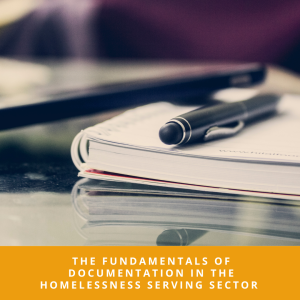Fundamentals of Documentation in the Homelessness Serving Sector
 About this Training:
About this Training:
For various reasons such as funder reporting requirements, validation of the work being done, protection of client interests, protection in potential legal proceedings, effective case management practices, and more, documentation happens regularly when working in human services. This is consistent with the homeless-serving sector. Therefore, staff must be familiar with and use appropriate best practices associated with their role.
You do great work every day with your participants. But could someone easily pick up where you left off without too much disruption and understand what has happened and where to go next? Would they have to ask the participant for more details about their situation to make sense of your notes? Would they easily know what the goals of your interaction are and what has been accomplished so far? Could you read a case note years later and accurately remember the finer details of the situation? Do you know what you need to capture in an incident report and why?
| Instructor Led (In-person and virtual options) |
|
Training Audience: This training is appropriate for:
Training can be tailored according to attendees and the community or system involved. Note – The TTA requests that all training include at a minimum, one member of leadership from each organization/agency represented, be present as a learner. |
|
Training Length: In-Person (preferred): 1 day (8 hrs) |
|
Training Capacity: In-Person: 35 maximum / 8 Minimum |
|
Training Objectives: In this training, participants will:
|
|
Training Prerequisite Onboarding Modules: Mandatory: None |
|
Certificate of Completion: Through the TTA LMs, attendees will have the ability to receive a certificate of completion for the training . Attendees must be present for the full training to do so. To receive a certificate, attendees must complete and pass a final knowledge check/assessment (within 30 days post training).
|
|
Training Costs: Please inquire using the “Request More Info” button to the right regarding fees. Please note that all fees quoted should be considered an “all-inclusive” cost which means there would be not additionl costs for travel, prep, admin, or other items added to the rate provided to you with the exception of provincial tax. Members: A system, community, or organization can become a “Member” by purchasing an annual subscription to self-paced online onboarding modules. Discounts on live training are available determined by the subscription package chosen. (See “Onboarding Module” section here). |
Creating good case notes is a fundamentally important part of the work done in the homelessness-serving sector and it enhances and reinforces the work done on the ground. This training provides participants with an understanding of why case notes are so vital and how to make them as clear and concise as possible. Trainees will be able to tailor the training content to their local context.
This training will help participants understand the importance of quality documentation. They will receive some learning related to legislation that guides documentation practices and they will be better equipped to handle core documenting elements in their day-to-day work. They will learn intricacies related to case note writing and the ethics of case writing. In addition, they will gain a clear understanding of how to effectively write appropriate reports, specifically incident reports, and have the opportunity to practice with a case scenario.
